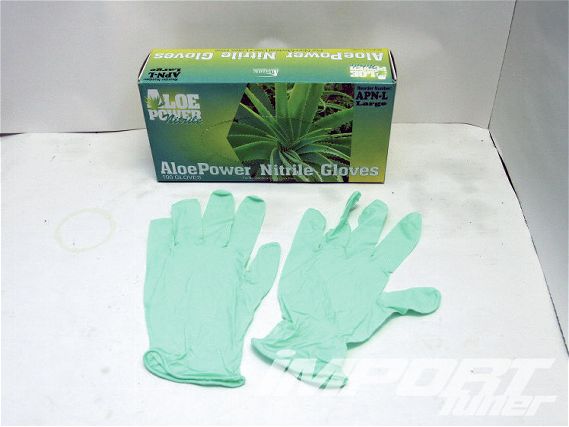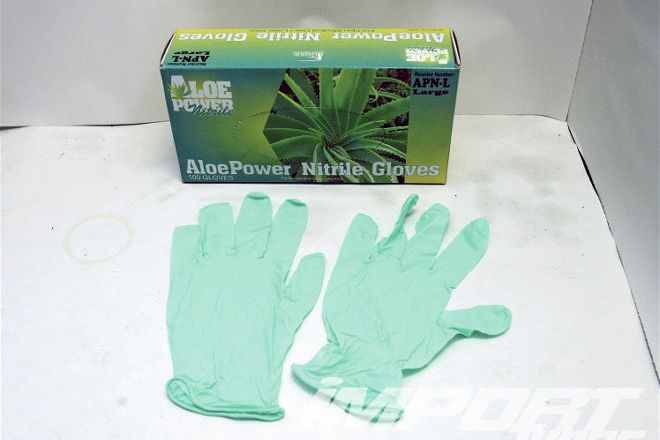It’s a sure bet that wrenching on your ride will result in dirty hands. Even checking something as simple as the engine oil level or tire pressures will do the trick. Brake fluid, gasoline, and oil can wreak havoc on your skin if wrenching bare-knuckled, creating dryness and irritation, not to mention the pain in the ass of removing grit and grime from under your fingernails.
 |
Aloe-Infused Nitrile Gloves - Tricks Of The Trade
|
Aloe-Infused Nitrile Gloves - Tricks Of The Trade
The simple solution is to use gloves to protect your hands, but which type should you use? Essentially, there are three: latex, vinyl, and nitrile. Latex gloves are commonly thought of as the disposable option—priced cheap and used by surgeons and airport TSA agents performing body cavity searches. While they’re great for menial tasks, they offer poor resistance to fuel, oil, and grease, and therefore really aren’t a sensible option for any sort of mechanical work. Vinyl gloves are more resistant to chemicals but are not as pliable as latex gloves due to their thickness, making them clumsy and awkward to work in when hand-tightening bolts or removing small items around the engine bay. Nitrile gloves, on the other hand, have advantages over latex gloves particularly from a mechanic’s perspective. Although nitrile gloves cost more than latex or vinyl gloves, they’re tougher and resist chemicals better. Here are some additional benefits:
• Nitrile is naturally resistant to oils, grease, and fuels. In fact, nitrile is used for fuel hoses and components inside fuel pumps.
• Nitrile gloves offer up to three times the puncture resistance of latex gloves.
• Nitrile gloves are far stronger than latex gloves in terms of mechanical/abrasion resistance.
• Nitrile gloves are manufactured with textured surfaces to improve grip on handled products.
Atlantic Safety Products, the same company who brought us the popular Black Lightning nitrile gloves, recently introduced a new aloe nitrile version that’s 5.5-mil thick. The Aloe Power nitrile gloves contain freeze-dried aloe vera inside the glove that activates by the natural body heat of the individual, thereby moisturizing the wearer’s hands. Atlantic Safety nitrile gloves are used by mechanics in various motorsports including Super GT, Formula Nippon, INDY, and American Le Mans.
 |
Aloe-Infused Nitrile Gloves - Tricks Of The Trade
|
Aloe-Infused Nitrile Gloves - Tricks Of The Trade
We put Aloe Power gloves to the test in a real-world environment, putting in a full day of work removing and stripping down an EJ25 Subaru STI engine. Off the bat, the Aloe Power gloves fit snug with very little loss of feel or flexibility that is needed when threading a bolt or reaching components in awkward places. After five hours straight of tearing apart the motor, we were thoroughly impressed by the amount of abuse the nitrile glove withstood. We didn’t find ourselves having to change gloves every time we changed a socket or screwdriver.
Although strong, nitrile gloves are not invincible, and are susceptible to damage when placed in strong solvents such as methyl ethyl ketone, typically found in paint chemicals, which will pass through the nitrile gloves at a rapid rate, causing them to last no longer than a few minutes.
In general, nitrile gloves are really one of the best disposable glove choices for the automotive industry. Be careful to use them for appropriate tasks and, if in doubt, check with the manufacturer to clarify the gloves’ specifications.






